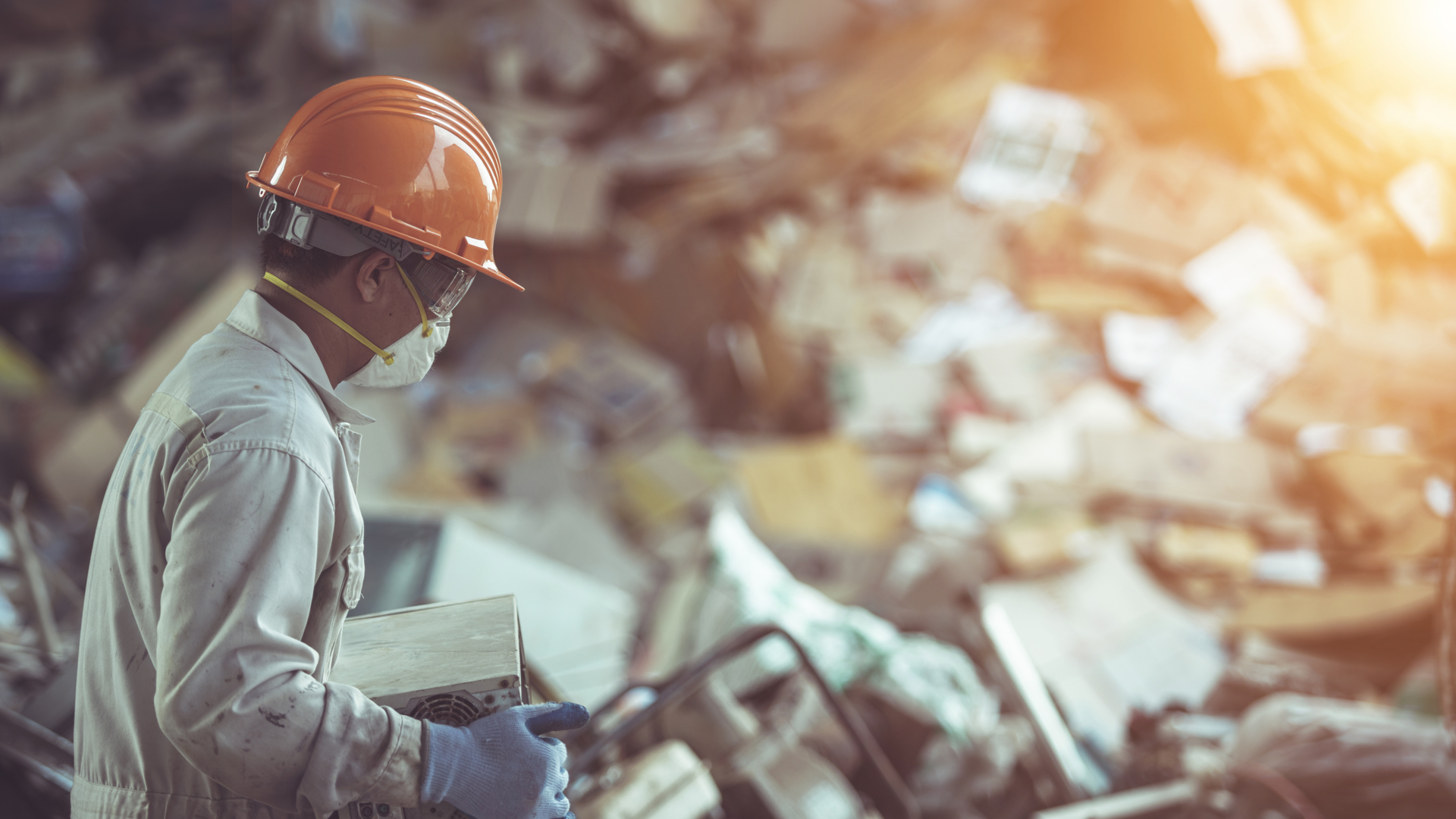MPs bash Amazon and Apple over UK e-waste crisis
The UK exports 200,000 tonnes of e-waste illegally each year, report reveals


Large tech companies and online retailers are flagrantly dodging their environmental responsibilities by dumping hundreds of thousands of tonnes of electronic waste each year, MPs have argued.
Companies such as Amazon and Apple have adopted practices that discourage recycling and repairs, the House of Commons’ Environmental Audit Committee (EAC) has concluded, at a time when 155,000 tonnes of e-waste is discarded or incinerated each year. This is a significant portion of the total 505,455 tonnes collected by the Waste Electrical sector, according to figures provided by the committee.
The UK generates the second-highest amount of e-waste per person in the world, after Norway, at 23.9kg of waste per person. This is significantly more than the global average of 7.3kg per capita, and the European average of 16.2kg. This has previously been described as a 'tsunami'.
Old electronics are also often shipped overseas where they’re dumped in landfill or sent to countries with poor track records for environmental standards.
The UK is among the worst offenders for exportation, the report found, with roughly 32,000 to 209,000 tonnes of e-waste being illegally exported each year to countries including Nigeria, Ghana and India, including items collected at local authority sites.
This electronic waste crisis in the UK is being exacerbated by the actions of larger companies. Amazon, for example, doesn’t collect or recycle electronics in the way other organisations are required to, the MPs claimed. The report also found that tech companies such as Apple glue and solder internal components in devices, making repairs near-impossible.
In Apple’s case, the MPs said that charges proposed for repair by Apple can be so expensive that it’s more economically viable to replace the item.
Get the ITPro daily newsletter
Sign up today and you will receive a free copy of our Future Focus 2025 report - the leading guidance on AI, cybersecurity and other IT challenges as per 700+ senior executives
"For too long companies like Amazon and Apple have been dodging their environmental responsibilities for the products they sell,” said the chair of the environmental audit committee, Philip Dunne MP.
“Too many devices sold and made by these companies have a limited, and sometimes decreasing, lifespan and end up in bins, eventually going to landfill or incineration. There is no chance of precious metals being retrieved, which could quickly become a huge problem as the rare and disappearing materials are crucial for renewable energy such as wind turbines, solar panels and electric car batteries.”
While these two companies were singled out by name, the report merely uses them to exemplify the lax attitude to environmental matters across the wider industry. Manufacturers such as Samsung and eBay were also highlighted in the report for having inadequate e-waste policies.
However, retailers DixonsCarphone and AO.com have been applauded for their retailer take-back schemes, with DixonsCarphone even allowing people to relinquish electronic goods regardless of where they were purchased from.
The environmental consequences are severe, the report added, contributing to the release of global emissions and toxic chemicals into the environment, including arsenic, lead and mercury. Not processing this e-waste in a constructive way also means losing forever the capacity to harvest precious metals such as gold, silver, copper and platinum that can be reused in the manufacture of other goods.
The report recommended dozens of changes to the law as well as a number of internal practices that should be adopted by tech companies and large online retailers. The government should, for example, enshrine the right to repair in law, and reduce VAT on repair services, as is the case in many EU countries. This would play a key role in enhancing the repair culture in the UK.
The EU parliament, incidentally, passed a resolution only this week to force a "right to repair" of electronic goods, by making repairs more appealing, systemic, and cost-effective for customers. This could be done by extending guarantees, providing additional guarantees for replaced parts, and by providing better access to information about device repairs and maintenance.
Companies should also follow the example set by firms such as DixonsCarphone in setting up clear take-back schemes, and regulators should model the rules around this “exemplary innovation”. This includes arranging and paying for the collection of electronics from a customer’s home, including offering to collect “small” waste.
Amazon and Apple would certainly argue they haven't ditched their environmental responsibilities, with the former launching a $2 billion climate technology fund in June, for example, and the latter pledging to be carbon neutral by 2030.

Keumars Afifi-Sabet is a writer and editor that specialises in public sector, cyber security, and cloud computing. He first joined ITPro as a staff writer in April 2018 and eventually became its Features Editor. Although a regular contributor to other tech sites in the past, these days you will find Keumars on LiveScience, where he runs its Technology section.
-
 Should AI PCs be part of your next hardware refresh?
Should AI PCs be part of your next hardware refresh?AI PCs are fast becoming a business staple and a surefire way to future-proof your business
By Bobby Hellard
-
 Westcon-Comstor and Vectra AI launch brace of new channel initiatives
Westcon-Comstor and Vectra AI launch brace of new channel initiativesNews Westcon-Comstor and Vectra AI have announced the launch of two new channel growth initiatives focused on the managed security service provider (MSSP) space and AWS Marketplace.
By Daniel Todd
-
 How to empower employees to accelerate emissions reduction
How to empower employees to accelerate emissions reductionin depth With ICT accounting for as much as 3% of global carbon emissions, the same as aviation, the industry needs to increase emissions reduction
By Fleur Doidge
-
 Worldwide IT spending to grow 4.3% in 2023, with no significant AI impact
Worldwide IT spending to grow 4.3% in 2023, with no significant AI impactNews Spending patterns have changed as companies take an inward focus
By Rory Bathgate
-
 Report: Female tech workers disproportionately affected by industry layoffs
Report: Female tech workers disproportionately affected by industry layoffsNews Layoffs continue to strike companies throughout the tech industry, with data showing females in both the UK and US are bearing the brunt of them more so than males
By Ross Kelly
-
 How can small businesses cope with inflation?
How can small businesses cope with inflation?Tutorial With high inflation increasing the cost of doing business, how can small businesses weather the storm?
By Sandra Vogel
-
 How to deal with inflation while undergoing digital transformation
How to deal with inflation while undergoing digital transformationIn-depth How can organizations stave off inflation while attempting to grow by digitally transforming their businesses?
By Sandra Vogel
-
 How businesses can use technology to fight inflation
How businesses can use technology to fight inflationTUTORIAL While technology can’t provide all the answers to fight rising inflation, it can help ease the pain on businesses in the long term
By Sandra Vogel
-
 Embattled WANdisco to cut 30% of workforce amid fraud scandal
Embattled WANdisco to cut 30% of workforce amid fraud scandalNews The layoffs follow the shock resignation of the company’s CEO and CFO in early April
By Ross Kelly
-
 Some Tech Nation programs could continue after Founders Forum acquisition
Some Tech Nation programs could continue after Founders Forum acquisitionNews The acquisition brings to a close a months-long saga over what the future holds for Tech Nation initiatives
By Ross Kelly